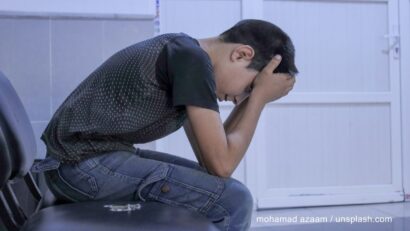Domestic Violence
Domestic violence is impossible to stand, and it is just as difficult to put in words, even if you are a witness or a therapist, involved in the psychological recovery of the victims. Physical abuse usually goes with domestic violence, but these acts manifest in other violent acts: economic violence, which means deliberately creating financial dependence for the abused victims; social violence, or isolation of the victim from relatives and friends; verbal violence, or the repetition of insults that seek to ruin the victim’s self-esteem.

Christine Leșcu, 16.03.2016, 13:38
Domestic violence is impossible to stand, and it is just as difficult to put in words, even if you are a witness or a therapist, involved in the psychological recovery of the victims. Physical abuse usually goes with domestic violence, but these acts manifest in other violent acts: economic violence, which means deliberately creating financial dependence for the abused victims; social violence, or isolation of the victim from relatives and friends; verbal violence, or the repetition of insults that seek to ruin the victim’s self-esteem.
Sexual violence also remains a major category of domestic violence, which, in most of the cases, is tantamount to marital violence. In Romania, all the aforementioned forms of domestic violence are regulated under Law no. 217/2003. It is a distinct law on preventing and fighting domestic violence, included in the Civil Procedure Code. According to the Fundamental Rights Agency, a European Union agency that monitors how fundamental human rights are observed in our country, such a law was needed, since the Agency revealed that one in four women was physically or sexually abused by her partner in Romania in 2015.
Yet, more than 70 percent of the abused women did not report the violence episodes to the authorities. Some of the reasons are included in the legislation itself, being actually flaws of the Law 217/2003, according to Corina Braga, the president of the Filia Center, an NGO that advocates for gender equality.
Corina Braga: “As of 2012, this law has started being amended, with the protection order being introduced as well, which is an absolutely necessary tool for the protection of domestic violence victims. The law also stipulates services provided for the victims of domestic violence as well as the earmarking of the required financial resources. However, there are quite a few cases when such financial resources have not been reassigned from the local budget. And that’s how we are sometimes faced with a situation when 13 counties offer no shelter for victims of domestic violence. Actually, the protection order, introduced only in 2012, does not secure immediate protection. The Network for Combating Domestic Violence, a network made of 24 NGOs, of which our foundation is also part, initiated the monitoring of the order’s implementation in 2012. On average, results show that it takes 33 days for the order to be issued from the application’s submission date. “
In 2015, 150,000 calls were made to the 112 emergency number to report acts of domestic violence. Despite this additional resource, only a thousand protection orders have been issued in such cases. Furthermore, the legal provisions intended to protect the victim or punish the perpetrator are currently hampered because of the bureaucracy, which also impinges on the victim. For instance, the entire amount of legal evidence is to a great extent the victim’s responsibility during a trial. Added to this is the suspicious perception by the community as well as the authorities’ reluctance to issue the interdiction orders for a variety of reasons.
With details on that, here is Andreea Braga once again: ”The victim is many times blamed by her entourage or the family, who say something like ‘ But what did you do, ‘cause he can’t have beaten you up for no reason?’. Even the authorities’ attitude is many times hostile or disheartening. There were cases when the victims dropped their complaint also because of the remarks made by policemen. They asked questions like: ‘What are we to do with the aggressor’s property right? How can we possibly evict him from their own home?’. But such a case has got nothing to do with an infringement of the property right, but with the victim’s superior right to safety. Since it takes 33 days for the order to be issued, the victim may continue to live with her aggressor, or, if she is offered shelter by relatives and friends, she may stay in touch with the aggressor who in turn can get in touch with her, who can threaten her or, on the contrary, behave very decently. Consequently, victims are sometimes discouraged to take further action and file a lawsuit. “
Whether they resort to justice or they remain silent, many battered women are looking for support from charity associations like ANAIS. Here, the victims are provided with legal counseling to prepare the case for court with special emphasis on psychological counseling in individual or group sessions. But even in such a safe and sympathetic environment, it takes a long time for inner wounds to heal as psychological violence leaves the most scaring marks on its victims.
Here is Mihaela Mangu, the president of ANAIS: “Many of them develop panic attacks because they spend a lot of time in tension, next to an aggressor. They get to fear to move or do anything else in order not to provoke the aggressor. After leaving so long in fear, once they manage to leave that environment, they continue to live with the conviction that something bad is always going to happen. Self-esteem is the most affected of all in such cases. Women are always told they are stupid, that they are no good, that they will never be able to make it on their own. All these, repeated day after day, can only lead to that self esteem getting even lower, and eventually leads to accepting violence.”
In late February, the Romanian Parliament ratified the European Council Convention, or the ‘Istanbul Convention’ on preventing and combating violence against women and domestic violence.
Andreea Braga told us more about the main provisions of this convention: “An emergency protection order must be introduced, issued within 24 hours. The Istanbul Convention calls it an ‘emergency barring order’ and, in certain cases of violence, it must be issued by authorities as soon as the act of violence is committed. Another important thing is that this convention admits the fact that most of the victims of domestic violence are women, and stresses that violence against women is the result of a long history of inequality between men and women. The ratification of this convention also entails prevention of violence. We hope that the school curricula will soon include courses on gender equality, respect between partners, solving conflicts through non-violence and recognizing the signs of violence against women.”
In the coming period, Romania must harmonize its legislation in order to implement this convention, especially if it wishes to preserve the well being of its female community.






























